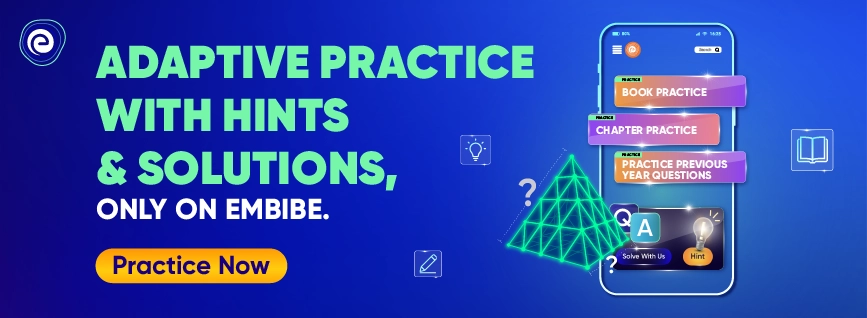- Written by aparna
- Last Modified on 29-07-2025
About Assam Board Class 6 Exam 2025
The Assam Secondary Education Act, 1961 (Assam Act XXV of 1961) was founded to establish a Board of Secondary Education to monitor, regulate, and improve secondary education in Assam. With the release of the Government of Assam, Education Department Notification on January 29, 1962, the Act became effective. On March 14, 1962, the Assam Board of Secondary Education (commonly known as SEBA) was established.
The Assam State Board of Education, also known as the Secondary Education Board of Assam (SEBA), was formed to govern, oversee, and improve secondary education in the state. This board of secondary education is in charge of administering the class 10 board test to all state board schools connected with it.
Assam Board Class 6 Exam Summary
Assam’s secondary education board was founded in 1962 to provide high-quality education to students. The Axom Sarba Siksha Abhiyan (SSA) organises the Assam Board class 6th examination. The Assam Board Class 6 exam is conducted internally by respective schools. All the schools affiliated to SEBA follow its guidelines with respect to curriculum and school-related activities. Check the table below to get an overview of the Assam Board Class 6 exam:
| Particulars |
Details |
| Board |
Board of Secondary Education, Assam (SEBA) |
| Commonly Known As |
SEBA |
| Formation |
January 29, 1962 |
| Headquarters |
Guwahati, Assam, India |
| Class |
Class 6 |
| Frequency of Exams |
Annual |
| Mode of Exam |
Offline |
Assam Board Official Website Link
https://ssa.assam.gov.in/
Assam Board Class 6 Exam Syllabus 2025
Students should be aware of their Assam Board Class 6 syllabus. It will help them prepare a good exam study plan. Students can check their subject-wise syllabus from this section. They can watch Embibe 3D videos, practice sample questions and take mock tests to do the best preparation for the final exam. The detailed syllabus for Assam Board Class 6th exam is provided below:
Assam Board Class 6 Mathematics Syllabus
Students can get full marks in Maths subject. They need to first understand the concepts clearly. After each topic or chapter, students should solve sample problems. The Assam Board Class 6 Maths syllabus is as follows:
| S. No. |
Unit Name |
Chapter Name |
Hours required to complete the unit |
|
1 |
Number System |
Knowing our Numbers |
60 Hours |
| Playing with Numbers |
| Whole numbers |
| Negative Numbers and Integers |
| Fractions |
| 2 |
Algebra |
Introduction To Algebra |
15 Hours |
| 3 |
Ratio and Proportion |
15 Hours |
|
|
4 |
Geometry |
Basic geometrical ideas (2 -D) |
65 Hours |
Understanding Elementary
Shapes (2-D and 3-D) |
| Symmetry: (reflection) |
Constructions (using
Straight edge Scale,
protractor, compasses) |
| 5 |
Mensuration |
Concept of Perimeter and Introduction to Area |
15 Hours |
| 6 |
Data Handling |
10 Hours |
|
Assam Board Class 6 Science Syllabus
The Science syllabus of Assam Board Class 6 has 7 units. Students can watch Embibe’s videos to learn their chapter topics and understand them more quickly. The Assam Board Class 6 Science syllabus is as follows:
| S. No |
Unit Name |
Chapter Name |
Periods required to complete the unit |
| 1 |
Food |
Sources of Food |
20 Periods |
| Components of Food |
| Cleaning Food |
|
2 |
Materials |
Materials of Daily Use |
26 Periods |
Different Kinds of
Materials |
How Things Change/
React with One Another |
|
3 |
The World of the Living |
Things Around Us |
36 Periods |
| The Habitat of the Living |
Plants – Form and
Function |
Animals – Form and
Function |
| 4 |
Moving Things,
People and Ideas |
Moving |
12 Periods |
| 5 |
How things work |
Electric Current and
Circuits |
28 Periods |
| Magnets |
| 6 |
Natural Phenomena |
Rain, Thunder and
Lightning |
26 Periods |
| Light |
| 7 |
Natural Resources |
Importance of Water |
|
| Importance of Air |
|
| Waste |
|
Assam Board Class 6 Social Science Syllabus
The Assam Board Class 6 Social Science syllabus is divided into History, Geography and Political Science. Students must study all the books to prepare for the exam. The Assam Board Class 6 Social Science syllabus is as under:
| History |
Geography |
Political Science |
| What, Where, How, and When? |
The Earth in the Solar System |
Understanding Diversity |
| On the trail of the earliest people |
Globe: Latitudes and Longitudes |
Diversity and Discrimination |
| From gathering to growing food |
Motions of the Earth |
What is Government? |
| In the earliest cities |
Maps |
Key elements of a Democratic Government |
| What books and burials tell us? |
Major Domains of the Earth |
Panchayati Raj |
| Kingdoms, Kings, and an early republic |
Major Landforms of the Earth |
Rural Administration |
| New questions and ideas |
Our Country- India |
Urban Administration |
| Ashoka the emperor |
India – Climate, Vegetation, and Wildlife |
Rural Livelihood |
| Vital Villages, thriving towns |
Urban Livelihood |
|
| Traders, Kings, and Pilgrims |
|
|
| New Empires and Kingdoms |
|
|
| Buildings, Paintings, and Books |
|
|
Practical/Experiments list & Model Writeup
In Science, students can do the following practicals/experiments and models:
| Chapter |
Experiments |
| Food |
Germination of seeds such as mung, chickpea etc.; preparing a chart on food habits of animals and food culture of different regions of India.
Studying the variety of food in different regions in India; preparing a menu of a balanced diet in the context of the diversity of foods eaten in different parts of the country. Classifying foods according to food components; test for starch, sugars, proteins and fats.
Discussion on threshing, winnowing, handpicking; experiments on sedimentation, filtration. Separating a mixture of salt and sand. |
| Materials |
Simple activities to distinguish among different types of cloth.
Experiments involving heating of air, wax, paper, metal, water to highlight effects like burning, expansion/compression, change of state. Discussion on other changes which cannot be reversed – growing up, the opening of a bud, ripening of fruit, curdling of milk.
Experiments for testing the solubility of commonly available substances. Experiments on the effect of heating and cooling on solubility. Comparison of solubilities of different substances using non-standard units (eg. spoon, paper cone). |
| The World of the Living |
Prepare herbarium specimens of different leaves, plants; study modifications in plants and animals; observe how different environmental factors (water availability, temperature) affect living organisms;
Activities to study X-rays, find out the direction in which joints bend, feel the ribs, backbone etc. Observation/ discussion on movement and skeletal system in other animals. |
| How things work |
Experiment to show that some objects (conductors) allow current to flow and others (insulators) do not. |
| Magnets |
Demonstrating how things are attracted by a magnet. Classification of objects into magnetic/ non-magnetic classes.
Activity to locate poles of a magnet; activity with iron filings and paper.
Activities with a suspended bar magnet and with the compass needle. |
Assam Board Class 6 Study Plan to Maximise Score
Students need to keep do sincere studies to score maximum marks in the exam. To ensure that they remember all the subject-wise concepts, students need to do regular revision, solve sample questions, and take mock tests. Mock tests will help students know how ready they are for the actual exam.
Assam Board Class 6 Preparation Tips
It is essential to emphasise the importance of sleeping early, waking up early, eating a nutritious meal, and then studying. Staying up late and fretting over unproductive times are both bad ideas. Allow yourself an hour or two to relax every day.
Make a daily study plan that works for you. When studying, having all of the required elements is just as important as having all the necessary ingredients when cooking. Don’t attempt to jam too many simple subjects/topics into one day, and don’t overburden yourself with difficult tasks. Start with an easy subject for an hour or so, then go on to a more difficult subject or topic once you’ve warmed up. Study for around 2 hours, then gradually improve your level of preparedness.
For example, if you find Mathematics challenging but English easy, start your study day by reading a chapter or two from your NCERT literary textbook for English or start with anything you deem simple.
Try your hand at a crossword puzzle once you’ve finished studying English. Increase the complexity of the problems you attempt gradually. After you’ve completed this exercise, take a break and come back to it with a topic you’re more familiar with.
It’s frequently claimed that match practice is the best kind of practice. Solve one sample question paper every day, preferably from 10 a.m. to 1 p.m., in a setting that is as near to that of your test centre as possible. After you’ve finished the paper, use the marking scheme to grade yourself.
For each of the five or six days, choose a new topic. Evaluate yourself after each week, discover your weak areas, and try to improve them in the next weeks. While working on the sample papers, make a point of solving the board’s sample papers. Attempting to practice question papers is one of the most efficient ways to prepare for your exams.
- Work on your relaxation skills
Exercise and meditation can help you concentrate better. Meditation is used by many sportsmen and sports professionals regularly. Concentration activities (meditation) have been linked to better health in studies. Studies have shown a link between concentration exercises (meditation) and sports professionals’ performance levels. Meditation enhances the power of your mind, allowing it to gain control. Psychological exercises are a fantastic method to boost your concentration and mental strength.
So, before you begin studying, take a stroll in the park or meditate for 15 minutes using yoga positions such as the Lotus Pose. Yoga and other types of exercise/meditation might help you relax and concentrate better.
Assam Board Class 6 Detailed Study plan
Forming a study group is a good idea. Each person should have a unique collection of talents and abilities. Use this to your advantage by passing on your expertise to one another. Organise a discussion on a chapter in your English literature textbook. Others in the group can then assist you by asking questions about their areas of expertise. Here are some more detailed study plan for each subject:
- Mathematics: To ace Assam Board Class 6 Mathematics, students need to understand all the concepts properly. They should make notes on topic-wise formulas and mention solved examples. afterwards, students should solve sample problems to check their strengths and weaknesses. Attempting mock tests will also help students get an exam-like experience.
- Social Science: Assam Board Class 6 Social Science is a theoretical subject. Students need to make notes on all the chapter topics and highlight the important points from them. They should revise these points regularly to remember them and write them in the exam. Mapping-practice in Geography is also very important to get good marks.
- Science: The best way to understand scientific concepts is to watch videos on the chapter topics. Embibe 3D videos can be very helpful for students to understand the topics. They should make notes for Science topics also and revise them. Students should also do lots of practice of drawing neatly-labelled diagrams.
FAQs on Assam Board Class 6 Exam 2025
Here are the most frequently asked questions about Assam Board Class 6th exam:
Q: What are the regulations for Assam Board Class 6 attendance?
Ans: A student must attend at least 75% of the classes offered, which can be tallied from the first day of a class’s instruction up to the 1st of the month preceding the Board’s test.
Q: Where can I get the Assam Board Class 6 syllabus?
Ans: Students can get the Assam Board Class 6 syllabus from this page.
Q: Where can I get sample questions for Assam Board Class 6 subjects?
Ans: Students can get Assam Board Class 6 sample questions on the Embibe app.
Q: Which is the best mock test series for Assam Board Class 6?
Ans: The mock tests on Embibe are among the best mock tests for Assam Board Class 6 exam preparation.
Q: What is the passing grade for the Assam 6th class exams?
Ans: To pass Assam Board 6th class exams, you must get at least 33 percent in each subject and in the aggregate.
You can also check:
List of Educational Institutions for Assam Board Class 6
With a literacy rate of 72.2 per cent, Assam is ranked 26th in India (as per Census 2011). For high school and upper secondary education, Assam has a lot of excellent schools. The article lists the top CBSE schools in Assam and state board and CISCE board institutions. The top schools in Assam are divided into three categories: day, boarding, and day-cum-boarding institutions.
Top Boarding Schools in Assam
| S. No |
Name of the School |
Board |
Location |
| 1 |
The Assam Valley School |
ISC |
Balipara |
| 2 |
Miles Bronson Residential School |
CBSE |
Borjhar, Guwahati |
| 3 |
Jawahar Navodaya Vidyalaya |
CBSE |
Barpeta/Jorhat/ Nalbari |
| 4 |
Sainik School |
CBSE |
Goalpara |
| 5 |
Jawahar Navodaya Vidyalaya |
CBSE |
Pailapool |
Top Day Schools in Assam
| S. No |
Name of the School |
Board |
Location |
| 1 |
Delhi Public School |
CBSE |
Numaligarh |
| 2 |
Don Bosco School |
CBSE |
Guwahati |
| 3 |
Sanskruti The Gurukul |
ISC |
Guwahati |
| 4 |
Army Public School |
CBSE |
Narangi, Kamrup |
| 5 |
Gurukul Grammar Senior Secondary School |
CBSE |
Guwahati |
| 6 |
Maharishi Vidya Mandir |
CBSE |
Basrajai |
| 7 |
Maria’s Public School |
CBSE |
Guwahati |
| 8 |
Shrimanta Shankar Academy |
CBSE |
Dispur |
| 9 |
Guru Teg Bahadur Academy School |
CBSE |
Tinsukia |
| 10 |
Kendriya Vidyalaya AFS |
CBSE |
Borjhar/Chabua |
Top Day-Cum-Boarding Schools in Assam
| S. No |
Name of the School |
Board |
Location |
| 1 |
Delhi Public School |
CBSE |
Guwahati |
| 2 |
NPS International School |
CBSE |
Guwahati |
| 3 |
Royal Global School |
CBSE |
Guwahati |
| 4 |
South Point School |
CBSE |
Guwahati |
Assam Board Class 6 Future Exams
Exams are one of the most essential techniques for bringing out students’ interests, capacity, and potential in today’s competitive environment. The board conducts a school-level test based on Continuous Comprehensive Evaluation (CCE) for advancement to the next grade. Apart from the traditional school-level test, we offer a variety of additional examinations in which students may participate and demonstrate their abilities and skills.
The following are some of the competitive examinations that students in class 6 can take:
- International Science Olympiad (ISO)
- International Mathematics Olympiad (IMO)
- English International Olympiad (EIO)
- General Knowledge International Olympiad (GKIO)
- International Computer Olympiad (ICO)
- International Drawing Olympiad (IDO)
- National Essay Olympiad (NESO)
- National Social Studies Olympiad (NSSO)
Some of the competitive exams to which class 6th students can start preparing for:
- National Talent Search Examination (NTSE): Students are tested based on their knowledge and understanding of Science, Mathematics, Social Science, Mental Ability and General Knowledge. Cash prizes and scholarships award qualified students for the next academic year.
- National Level Science Talent Search Exam (NLSTSE): The exam consists of subjects like Mathematics, Physics, Chemistry, Biology and other general Awareness questions.
- Indian National Olympiad (INO): The Syllabus includes Physics, Chemistry, Biology, Astronomy and Junior Science. This exam contains a five-stage procedure. The initial stage is the written exam conducted by NSE (National Standard Examination).
- GeoGenius: This exam aims to create interest in geography. In this exam, students are asked to mark the various locations of India on a blank map.
- National Interactive Mathematics Olympiad (NIMO): This exam tests and analyses students’ mental ability and mathematical skills. This exam aims to identify students with exceptional skills and interests in the area of mathematics.
We hope this post on the Assam Board Class 6th exam helps you. If you have any queries regarding the exam, feel to reach out to us via the live chat box, which is accessible when signed in. We will surely help you.
Stay tuned to Embibe for the latest updates on Assam Board Class 6th Exam!














































